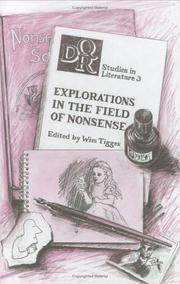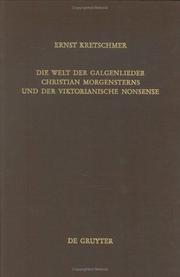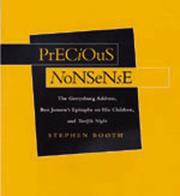| Listing 1 - 10 of 13 | << page >> |
Sort by
|
Book
Year: 1654 Publisher: [London : s.n.,
Abstract | Keywords | Export | Availability | Bookmark
 Loading...
Loading...Choose an application
- Reference Manager
- EndNote
- RefWorks (Direct export to RefWorks)
eebo-0018
Book
Abstract | Keywords | Export | Availability | Bookmark
 Loading...
Loading...Choose an application
- Reference Manager
- EndNote
- RefWorks (Direct export to RefWorks)
A collection of Lear's nonsense songs, stories, rhymes, alphabets, and pictures taken from "Nonsense Songs and Stories," "Nonsense Botany," and "Nonsense Alphabets."
Book
ISBN: 3110859491 Year: 2019 Publisher: Berlin ; Boston : De Gruyter,
Abstract | Keywords | Export | Availability | Bookmark
 Loading...
Loading...Choose an application
- Reference Manager
- EndNote
- RefWorks (Direct export to RefWorks)
Nonsense literature, English --- English literature --- History and criticism. --- Morgenstern, Christian,
Book
ISBN: 0823297462 082329448X 9780823294497 0823294498 9780823294480 9780823294466 9780823294473 Year: 2021 Publisher: New York Baltimore, Md.
Abstract | Keywords | Export | Availability | Bookmark
 Loading...
Loading...Choose an application
- Reference Manager
- EndNote
- RefWorks (Direct export to RefWorks)
Five hundred years before 'Jabberwocky' and Tender Buttons, writers were already preoccupied with the question of nonsense. But even as the prevalence in medieval texts of gibberish, babble, birdsong, and allusions to bare voice has come into view in recent years, an impression persists that these phenomena are exceptions that prove the rule of the period's theologically motivated commitment to the kernel of meaning over and against the shell of the mere letter. This book shows that, to the contrary, the foundational object of study of medieval linguistic thought was vox non-significativa, the utterance insofar as it means nothing whatsoever, and that this fact was not lost on medieval writers of various kinds.
English literature --- Nonsense literature, English --- Philosophy, Medieval. --- History and criticism.
Book
ISBN: 144384361X 9781443843614 9781443810067 1443810061 9781443899475 144389947X Year: 2016 Publisher: Newcastle upon Tyne
Abstract | Keywords | Export | Availability | Bookmark
 Loading...
Loading...Choose an application
- Reference Manager
- EndNote
- RefWorks (Direct export to RefWorks)
Roger Corman is an ambiguous artistic figure. On the one hand, he is notorious for shooting and producing his films quickly, cheaply and with blatant disregard for safety measures, which, together with his ability to issue a dozen new films every year and his impressive filmography, have earned him the titles of "shlockmeister" and "the King of the B's" among film journalists. On the other hand, he became the youngest American director to be given a film retrospective at the prestigious Cinématèque Française in Paris, one of his directorial efforts - House of Usher - was selected for preservation in the National Film Registry by the Library of Congress, and the Academy of Motion Picture Arts and Sciences awarded him with an Academy Honorary Award "for his rich engendering of films and filmmakers." This book investigates this duality and explores whether Corman is indeed a shlockmeister or an artist whose works are worthy of the highest cinema awards. The scope of analysis is limited to his directorial efforts "only" - still encompassing 50 features - excluding the 400 films he produced. The methodology adopted here is based on the auteur theory in its structuralist version by Geoffrey Nowell-Smith and Peter Wollen, and focuses on three areas of interest: work ethic - personal elements in the films, personal control over and commitment to the production process outside direction; themes - topics and concerns common for many of the films regardless of the genre; and style - recurring stylistic motifs and elements in the camerawork, editing, and framing.

ISBN: 9062036996 9789062036998 9789004484252 Year: 1987 Volume: 62 3 Publisher: Amsterdam
Abstract | Keywords | Export | Availability | Bookmark
 Loading...
Loading...Choose an application
- Reference Manager
- EndNote
- RefWorks (Direct export to RefWorks)
Literature --- Nonsense literature, English --- Nonsense literature, American --- History and criticism --- -Nonsense literature, English --- -English nonsense literature --- Nonsense literature, English, [etc.] --- English literature --- American nonsense literature --- American literature --- -History and criticism --- Nonsense literature, English - History and criticism --- Nonsense literature, American - History and criticism --- English nonsense literature

ISBN: 3110095068 9783110095067 Year: 1983 Volume: 79(203) Publisher: Berlin de Gruyter
Abstract | Keywords | Export | Availability | Bookmark
 Loading...
Loading...Choose an application
- Reference Manager
- EndNote
- RefWorks (Direct export to RefWorks)
Nonsense literature, English --- English literature --- History and criticism --- Morgenstern, Christian, --- -Nonsense literature, English --- -English nonsense literature --- Nonsense literature, English, [etc.] --- British literature --- Inklings (Group of writers) --- Nonsense Club (Group of writers) --- Order of the Fancy (Group of writers) --- Morgenstern, Christian --- -History and criticism --- English nonsense literature --- Nonsense literature, English - History and criticism --- English literature - 19th century - History and criticism --- Morgenstern, Christian, - 1871-1914 - Galgenlieder

ISBN: 0520212886 0585264007 Year: 1998 Publisher: Berkeley : University of California Press,
Abstract | Keywords | Export | Availability | Bookmark
 Loading...
Loading...Choose an application
- Reference Manager
- EndNote
- RefWorks (Direct export to RefWorks)
Why do we value literature so? Many would say for the experience it brings us. But what is it about that experience that makes us treasure certain writings above others? Stephen Booth suggests that the greatest appeal of our most valued works may be that they are, in one way or another, nonsensical. He uses three disparate texts--the Gettysburg Address, Ben Jonson's epitaphs on his children, and Shakespeare's 'Twelfth Night'--to demonstrate how poetics triumphs over logic in the invigorating mental activity that enriches our experience of reading. Booth presents his case in a book that is crisply playful while at the same time thoroughly analytical. He demonstrates the lapses in logic and the irrational connections in examples of very different types of literature, showing how they come close to incoherence yet maintain for the reader a reliable order and purpose. Ultimately, Booth argues, literature gives us the capacity to cope effortlessly with, and even to transcend, the complicated and demanding mental experiences it generates for us. This book is in part a witty critique of the trends--old and new--of literary criticism, written by an accomplished and gifted scholar. But it is also a testimony to the power of the process of reading itself. 'Precious Nonsense' is certain to bring pleasure to anyone interested in language and its beguiling possibilities.
English literature --- Nonsense literature, English --- English Literature --- English --- Languages & Literatures --- History and criticism. --- History and criticism --- Shakespeare, William, --- Lincoln, Abraham, --- Jonson, Ben, --- English nonsense literature --- Nonsense literature, English, [etc.] --- Goldmark, Rubin,
Book
ISBN: 0900572515 Year: 1972 Volume: 1972 Publisher: Nottingham : University of Nottingham,
Abstract | Keywords | Export | Availability | Bookmark
 Loading...
Loading...Choose an application
- Reference Manager
- EndNote
- RefWorks (Direct export to RefWorks)
Book
ISBN: 902343546X 9789023435464 Year: 1996 Publisher: Amsterdam Uitgeverij De Bezige Bij
Abstract | Keywords | Export | Availability | Bookmark
 Loading...
Loading...Choose an application
- Reference Manager
- EndNote
- RefWorks (Direct export to RefWorks)
Carroll, Lewis --- Nonsense literature, English --- Fantasy literature, English --- Logic in literature. --- History and criticism. --- Logic in literature --- -Fantasy literature, English --- -English fantasy literature --- Fantastic literature, English --- English literature --- English nonsense literature --- Nonsense literature, English, [etc.] --- History and criticism --- -History and criticism --- Dodgson, Charles Lutwidge --- Carroll, Lewis, --- Testoni, Giampaolo, --- Nonsense literature, English - History and criticism. --- Fantasy literature, English - History and criticism.
| Listing 1 - 10 of 13 | << page >> |
Sort by
|

 Search
Search Feedback
Feedback About UniCat
About UniCat  Help
Help News
News